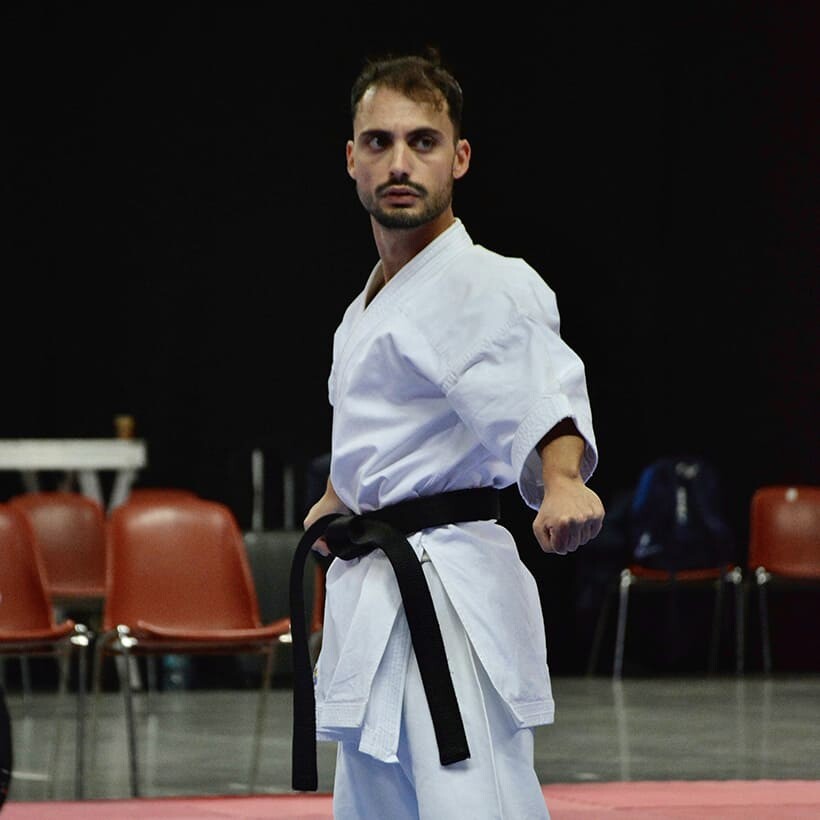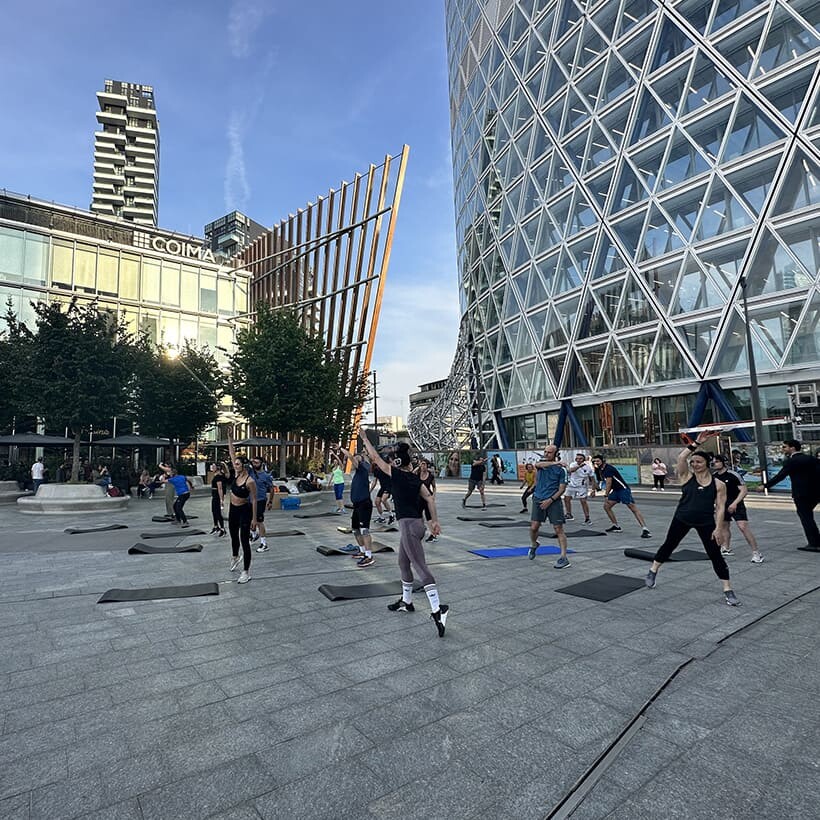One-to-one with Rocco Graziano: "your weakness can become your secreat weapon"
Growing up in Basilicata and Calabria, between Nova Siri (Matera) and his father’s home town Cariati (Cosenza), Rocco Graziano started practising karate at age 8 and conquered the World Cup not once but twice. Today he lives in Milan, is a very popular personal trainerand a brand ambassador for Adidas, has 100k followers on Instagram and is ready to touch down at Portanuova with his MindtheGApp format.
PN: It’s a pleasure to meet you, Rocco… When, how and where did this incredible inner strength and determination that brought you so far in sport emerged?
RG: There is a fundamental element above all: my height. My size. I am about 1.50 m tall, thus well below average. This has immediately affected my life: I was judged ever since my childhood, sometimes even in excess, as if it were a crime. I need to thank my parents who have always tried to teach me how the body is just a container of the person, his spirit, his soul, his strength and his goodness. Looking back, my stature was a motivation, a hunger, a wick that lit my fire.
I was 8 years old and I always went to bed at 9:30 p.m. One night my father made me stay up late because a Bruce Lee film was on, on public TV. He told me a Bruce Lee film was the first he had ever seen at a cinema when he was young. He wanted me to watch that movie because he believed it taught values that went well beyond fighting. He was right. From that day on, I started putting pressure on him to start taking karate lessons. My parents immediately understood it was a way for me to express my personality freely, despite my height.
I felt at home at the gym and started going there every day.
PN: And you keep on going today: congratulations Rocco! But the question that might give a little hope to us ‘Sunday leaguers’ is… Is the ‘champions’ mentality’ a skill you only acquire through hardcore training or can a ‘mere mortal’ with competitive ambitions exist too?
RG: Our determination derives from anything that makes us feel alive. If you recognize the area you feel comfortable in and can feel free to express yourself without prejudice and without needing to prove who you are, you reach inner peace. At that point, you do everything you do for yourself, because it makes you feel good and unfettered: you do not do it for others. Only then you can truly invest energy in an activity, whether it’s karate or gardening.

PN: So Rocco, you come from the town I’ve heard about from you for the first time in my life, 15 minutes ago… Tell us how you approached Milan and what you think quality of life is: what features of the city do you find it in if you find it at all?
RG: I owe a lot to Milan and I shall always thank this city. I come from a little town in Southern Italy: my parents drove me for 60 km (37 mi), both ways, to train in the closest proper gym. For years. I immediately experienced Milan like a heaven, a celebration, a sea of opportunities. Being here means going around to different cafés and restaurants at will, training a stone’s throw away from home and getting to know so many different people… People who are open-minded and never make me feel ‘inferior’ because of my height. In Milan, my height has become something you remember me by: a peculiarity, not an imperfection.
PN: Have you ever experienced a neighbourhood, an urban district or another context where sport has been a ‘model’ to improve the life of the context itself?
RG: In my case, in my small setting, sport has been a unifier able to move closer individuals of very different cultures and social classes, while treating them all in the same way. Sport is inclusive, and today I try to create groups of people who love the same activities and can contribute to them in different ways, which is their added value.
PN: Speaking of groups of sport enthusiasts… MindtheGApp. Can you explain to us how this format was born?
RG: This format was born out of the will to do something even during the pandemic, when it was truly difficult to work as a group. Our format provides groups of people experiencing the same everyday life (thus work colleagues or fellow residents of the same complex, for instance) a series of services related to mental and fitness activity led by professional trainers selected by myself and my team. This will soon become an app that will include numerous – and potentially customized – courses available for all the members of the community.
PN: Give us 3 reasons to sign up to MindtheGApp.
RG: One: to be mentally and physically fit through a tailor-made plan. Two: to save time and money spent on courses of a debatable value. Three: to network with people experiencing the same daily routine as you.
PN: Is MindtheGApp more of a mental or physical activity?
And please tell us why…
RG: Without even mentioning MindtheGApp, I can immediately reply that I have never considered that there is a clear separation between the mind and body. Ever. Even when I train strictly to gain muscle mass, the mind is always there: it always takes command.
PN: So… can sport open the door to useful worlds even in a professional scope? What are the benefits of having a ‘winning’ mindset in daily life?
RG: My mentality in sport is by all means retraceable even in my professional life and in any context where willpower is required. My master once told me:
‘When you finish a race, don’t look at the score but close your eyes and look inside yourself. Are you pleased with what you have done? Are you sure and convinced you can hold your head high because you did your best? If the answer is yes, open your eyes: you won the race regardless of the score.’

PN: What is the difference between knowing how to do and knowing how to teach?
RG: Not all Ballon d’Or winners have become great managers. Knowing how to convey skills and discipline is also a talent. I do not know the difference but I can surely tell you the most recurring and fundamental error I see: when you teach, you cannot put yourself at the centre of attention; you need to step aside and let the students pick the juiciest fruit from the tree. You need to teach them how to recognize it and grasp it.
PN: Can you tell us how to live a healthy life like yours? Is it always a matter of self-discipline – thus remains a sacrifice – or is it a choice that turns into a mere routine?
RG: You can say I have studied this aspect in depth and I never use the word ‘sacrifice’ but, rather, I say ‘investment’. If I do everything I do to achieve a goal I believe in, there is no such thing as a ‘waste of time’ but only ‘time well spent’. If I hate to give up on something, I do not focus on the thing I let go of but on the goal such an investment will help me to reach. When you have a serious goal, there is no such thing as ‘giving up’: you only ‘invest’.
PN: They say you learn more from defeat than from success… Tell us something about the hardest time in your professional sporting career.
RG: That adage is true! In my case, I suffered a serious injury when I was 21 (in 2012). Everyone said I would never fight again, and each time I heard those words was like having a new, incurable scar. I didn’t know what to do with myself and my life. I couldn’t accept the fact that an injury or an external factor could choose the way my life would go after everything I’d done to become who I was. Then I met a doctor who believed in my determination. He isn’t only a surgeon, he is like a psychologist. His name is Massimo Berruto. Unlike everyone else, he did not ask me whether I was ‘truly convinced I wanted to fight again’ but, more simply, ‘when I would have liked to fight next’. The European Championships were 8 months away. In the end, I made it: I got back up. And here I am.
PN: If Rocco Graziano weren’t a karate champion, who would he be?
RG: That’s another thing the injury helped me understand. I realized that Rocco Graziano wouldn’t be a champion for eternity and I needed to work on a professional path beyond competitive sport. That is when I changed my university career: I switched to Sports Science and I included the things I had learned as an athlete in my professional skillset as a trainer.
PN: Rocco, have you ever thought of living at Portanuova?
RG: (Laughs) I’d love to: as well as the architectural beauty of the district, I love its effort to create a ‘community’. It is an animated and tangible network of people, opportunities, innovative services and sustainability. Perhaps when I’ll save up enough money…